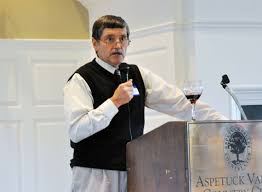

“Here’s to plain speaking and clear understanding,” Kasper Gutman to Sam Spade in The Maltese Falcon by Dashiell Hammett.
American History
Americans of all sizes, types, colors, gender, and political and religious persuasions seem at a loss as to what type of government this nation was founded on. A clue can be found in the Pledge of Allegiance: “I pledge allegiance to the flag of the United States of America. And to the…” or Article IV, Section 4 of the United States Constitution: “The United States shall guarantee to every state in this union a ____ form of government.” The word is “Republic.” For many of the Founders were foes of Democracy. This talk will explain while referring to the Founders’ words and writings, the differences between Democracy and Republic and why the Founders were opponents of the former. As a bonus, this talk will include briefs on Socialism, Marxism (again, many seem confused as to the commonalities and differences), Fascism, and Syndicalism.
At the height of the Great Depression, with America saddled with a 25 percent unemployment rate, retired Marine Corps Major General Smedley Darlington Butler reported to Congress that he had been approached to take part in a Wall Street-Fascist plot against President Franklin D. Roosevelt. This would commence an investigation by the McCormack-Dickstein Committee, the first House of Un-American Activities Committee, convened in 1933-1934. Such names of American privilege as the Du Ponts, Pitcairns, the Morgan interests, Remington Arms, elements of the American Legion, Guaranty Trust, and its director, Grayson M.P. Murphy, are just some of those considered participants in the plot. But in the end, no one will ever be prosecuted, as in the 2008 Banking Crisis. The American Putsch or Business Plot is a forgotten episode during a dark period in American history and should be resurrected for the new generations.
The Declaration of Independence, considered America’s founding document, was also a Declaration of War against the globe’s ranking imperialist power, Britain. But this document is more than a simple expression of wanting a divorce from the oppressive Crown; it was a unifier, an effort at organizing, what had been up to 1776, a spontaneous uprising throughout the colonies. Uprisings which led to local attempts at political control. Committees of public safety enabled colonists to establish control in their locales. But revolutions cannot be successful when they lack cohesion. And the 56 signers from 13 colonies display that attempt at unity… a unity that will eventually lead to the Constitution and its attendant Bill of Rights. The actual title of the Declaration of Independence is “The Unanimous Declaration of the Thirteen United States of America.”
One of the most misunderstood aspects of the American Republic. Found in Article II, Section I, of the Constitution. "Electors" were applied to act as a check on the voters. Part of the system of Checks and Balances which made the Republic unique. Some of the Founding generation did not trust the Common Man to preserve Representative Government; and, sought to marginalize or safeguard against the unsteadiness and tempestuousness of the masses.
In August 1971, Lewis Powell, who would be named to the Supreme Court by President Richard Nixon, penned a wake up call for Business. America, it seemed, was being suborned by such popular agendas as the Civil Rights Movement; the Anti-War Movement; in addition to America's young as well as academics in colleges and universities who were questioning Capitalism. . . Powell's doctrine to the Chamber of Commerce was a wake up call to the Business Community. He urged Business to take a position in the Education System; the Media; become more politically aware and involved. And so the Business will do so, with Conservative Think Tanks, Political Action Committees. . . And among certain individuals Powell criticizes as being anti-business, Ralph Nader. Indeed, the Powell Memo will become the Manifesto of American Fascism.
This talk will not dwell on the attack itself; that is aired every year on many television stations. Rather this talk will address the "why?" Why did the Japanese attack a sleeping U.S. fleet in the Hawaiian Islands on the Day of Infamy. This talk, then, will commence with the rise of Japan as a power in the 19th century; the resulting friction between Japan and the United States in the world's largest ocean; the significance of oil; the determinant known as naval power; the tumultuous decade of the 1930s; and, why December 1941 was the turning point of a war that did not start on 1939; but, 1914.
A decisive development in the history of the United States. For by 1898, Chesapeake Bay was linked with the Golden Gate. With the absorption of Cuba, Puerto Rico, the Philippines and Guam, Manifest Destiny ceased being an agenda for Continental expansion and became a doctrine for globalism. America was cutting its ties to its colonial roots and joining the club of imperialist nations. A decisive step was taken towards the destruction of the Republic and Representative Government, giving way to . . . Pax Americana, the American Empire.
The Militia noted in the Second Amendment and bolstered by the 1792 Militia Act no longer applies. The Militia concept was based on state control by the governors, as opposed to staffing a large conventional army which many of the Founders saw as a threat to the viability of the Republic. But with America's ascension to the ranks of the imperialist powers, the 1792 Militia Act was superseded by the 1903 National Guard Act. Today's National Guard is not the Citizen Soldier concept as originally conceived. For the National Guard today is a bona fide reserve of the United States Army.
General History
Biographies
Series
Grand Republic to Corporate State, Part I: This eight week series is an eight-week course taught for the Lifetime Learners Institute at Norwalk Community College in Norwalk, Connecticut. Series can be presented in its entirety, in parcels or with each talk chosen for the purposes of a single presentation. "Click here" for the description and syllabus.
This eight-week series is an eight-week course taught for the Lifetime Learners Institute at Norwalk Community College in Norwalk, Connecticut. Series can be presented in its entirety, in parcels or with each talk chosen for the purposes of a single presentation. "Click here" for the description and syllabus.
2019 marks the 400th anniversary of Dutch traders bringing the first 20 Black "laborers" to North America, landing them at Jamestown. Thus began the bondage of a people transshipped from their homeland to an alien environment and then, consigned to the hell of forced labor. The resulting network of plantations was, in reality, a concentration camp system that was the engine of American Agrarian Capitalism. A vile system of exploitation practiced many more years under the Stars and Stripes than under the Stars and Bars. A mechanism of restraint that consigned unpaid toilers to an endless purgatory of servitude; thus, setting the stage for the resulting scourge of Racism, together with its poisonous progeny, White Supremacy. Four hundred years after the advent of America's Original Sin, the Black Man has yet to overcome the status of Second Class Citizenship. "Click here" for series description and syllabus.
This eight-week course taught at Norwalk Community College for the Lifetime Learners Institute in Norwalk Connecticut, traces the doctrine of Communism, from the French Revolution to Marx and Engels; to Lenin; to Stalin; to Mao Tse-tung, as well as other theorists such as Ho Chi Minh, Milovan Djilas, Tito, etc. Series can be presented in its entirety or in abbreviated form or as single presentations. "Click here" for description and syllabus.
The upheaval that led to the demise of the Romanovs was one of the decisive events of the 20th century. Lenin's Bolshvik Revolution would, in the end, result in the Stalinist State. This, in turn, would see to the rise of the Soviet Union as one of the globe's major industrial powers, to the extent that Soviet industrial power would be one of the secret keys for Allied victory over Nazi Germany. "Click here" for series description and syllabus. This eight-week series is taught as a course for the Lifetime Learners Institute at Norwalk Community College in Norwalk, Connecticut. The series may be presented in its entirety, as single topics or as an abbreviated or shortened series.
This eight-week series is a course taught for the Lifetime Learners Institute at Norwalk Community College in Norwalk, Connecticut. The series focuses on Germany from the Confederation of the Rhine to Hitler's purge of Ernst Rohm and the leadership of the Storm Trooper leadership, the Night of the Long Knives, June 30-July 1, 1934. Series can be presented in its entirety, in parcels or as single talks. "Click here" for series description and syllabus.
This eight-week series is a course taught for the Lifetime Learners Institute at Norwalk Community College at Norwalk, Connecticut. This series is a follow on from Third Reich, Part 1, The Nazi Revolution, 1919-1934. The Nazi State dissects Nazi Germany, delving into Hitler's Reich politically, economically, socially. . . The series may be presented in its entirety, in parcels or as single talks. "Click here" for series description and syllabus.
2020 marks the centennial of the 19th Amendment, the Women's Right to Vote. This four-talk set commemorates this significant event in American political history. Please "click here" for series syllabus and descriptions: